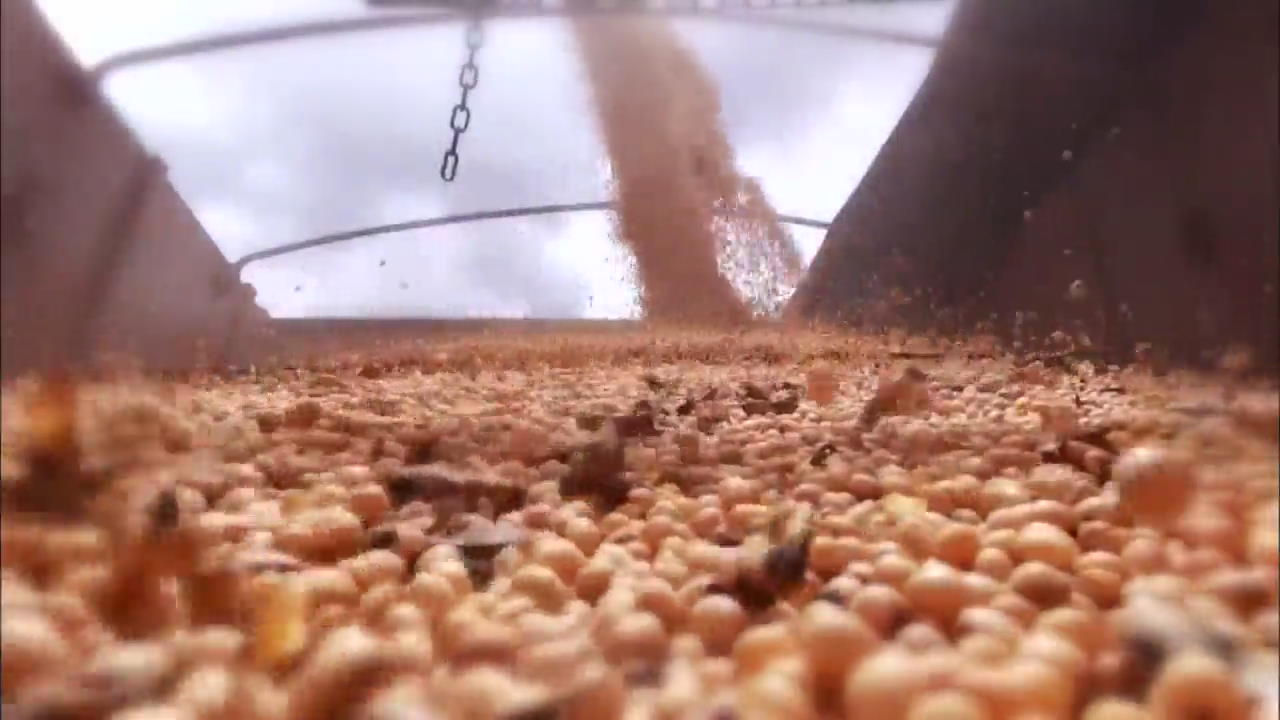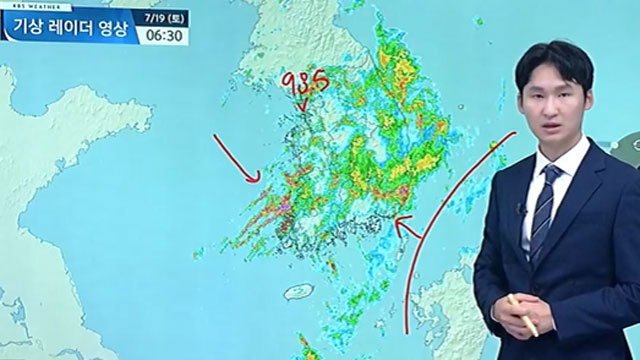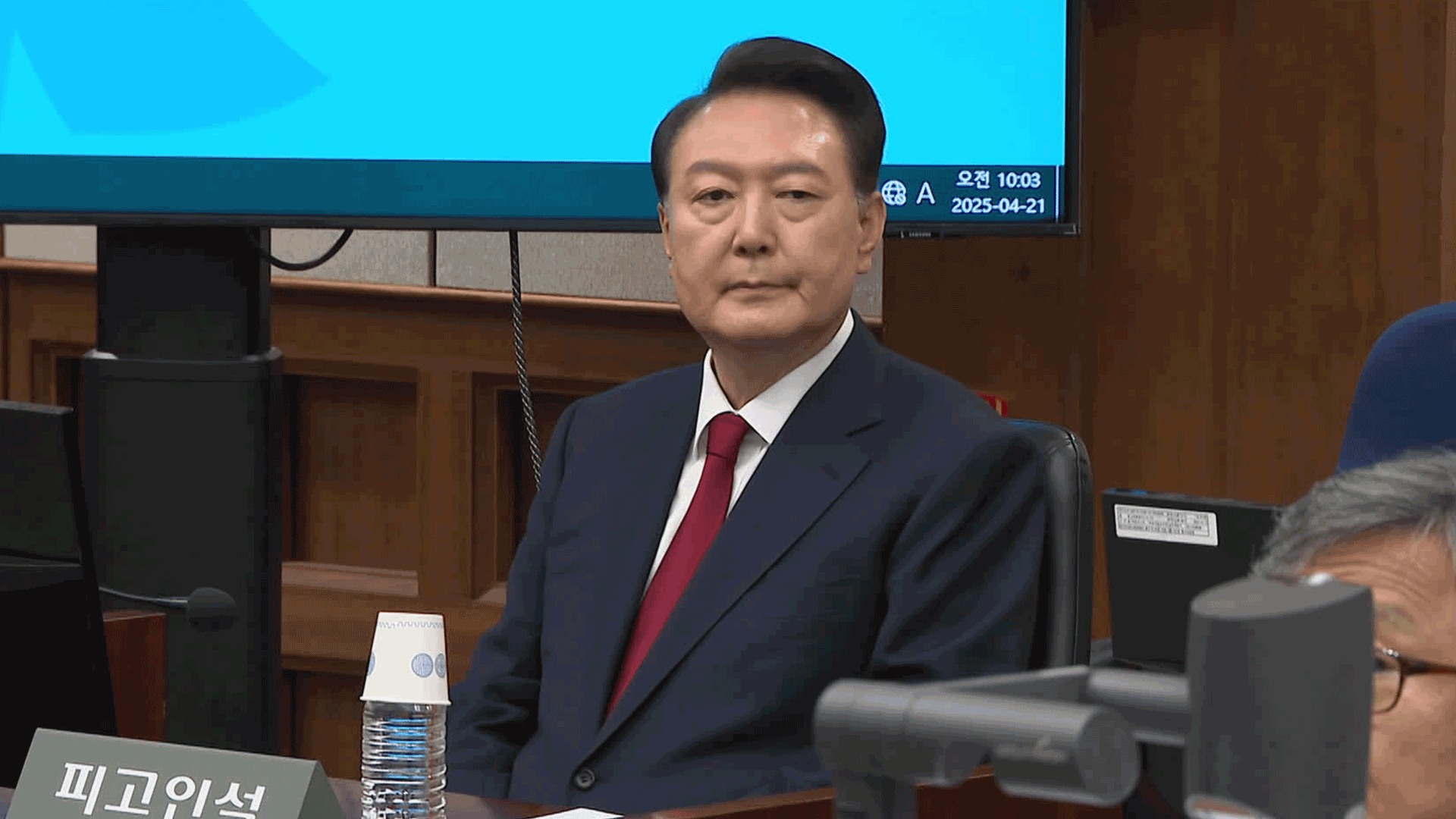Grain Competition
입력 2016.09.20 (14:10)
수정 2016.09.20 (14:28)
읽어주기 기능은 크롬기반의
브라우저에서만 사용하실 수 있습니다.
[Anchor Lead]
It's been reported that the grain grown on Korean soil can meet only 24% of the country's demand. As countries around the world experience grain shortages, multinational agricultural giants are competing fiercely to secure crops.
[Pkg]
Vast farms the size of Seoul are harvesting soybeans and corn raised on a double-cropping system. More than half the grains grown here are predestined for certain buyers even before they are planted. The world's four largest agricultural companies have built huge warehouses as they competete to buy up grains.
[Soundbite] Louis(Brazilian Farm Owner) : "Four major agricultural companies here are buying up grains and selling them worldwide."
In recent years Japanese and Chinese businesses have joined the crop war. Japanese general trading companies like Marubeni and Mitsubishi have expanded to the crop farming industry. China's state-run agricultural company COFCO became the world's sixth largest grain company through aggressive mergers and acquisitions of foreign businesses. Starting last year, Korean corporations have also been visiting farms and warehouses in Brazil. The aim is to carve out an independent grain import channel without relying on foreign businesses.
[Soundbite] Moon Gyeong-ju(Head of Brazil branch, Harim Pan Ocean) : "We aim to secure long-term, stable food resources by building our own grain supply system which encompasses grain producers, logistics systems, and distribution networks."
Countries around the world are involved in an increasingly fierce competition to secure a steady supply of grains.
It's been reported that the grain grown on Korean soil can meet only 24% of the country's demand. As countries around the world experience grain shortages, multinational agricultural giants are competing fiercely to secure crops.
[Pkg]
Vast farms the size of Seoul are harvesting soybeans and corn raised on a double-cropping system. More than half the grains grown here are predestined for certain buyers even before they are planted. The world's four largest agricultural companies have built huge warehouses as they competete to buy up grains.
[Soundbite] Louis(Brazilian Farm Owner) : "Four major agricultural companies here are buying up grains and selling them worldwide."
In recent years Japanese and Chinese businesses have joined the crop war. Japanese general trading companies like Marubeni and Mitsubishi have expanded to the crop farming industry. China's state-run agricultural company COFCO became the world's sixth largest grain company through aggressive mergers and acquisitions of foreign businesses. Starting last year, Korean corporations have also been visiting farms and warehouses in Brazil. The aim is to carve out an independent grain import channel without relying on foreign businesses.
[Soundbite] Moon Gyeong-ju(Head of Brazil branch, Harim Pan Ocean) : "We aim to secure long-term, stable food resources by building our own grain supply system which encompasses grain producers, logistics systems, and distribution networks."
Countries around the world are involved in an increasingly fierce competition to secure a steady supply of grains.
■ 제보하기
▷ 카카오톡 : 'KBS제보' 검색, 채널 추가
▷ 전화 : 02-781-1234, 4444
▷ 이메일 : kbs1234@kbs.co.kr
▷ 유튜브, 네이버, 카카오에서도 KBS뉴스를 구독해주세요!
- Grain Competition
-
- 입력 2016-09-20 14:12:24
- 수정2016-09-20 14:28:30

[Anchor Lead]
It's been reported that the grain grown on Korean soil can meet only 24% of the country's demand. As countries around the world experience grain shortages, multinational agricultural giants are competing fiercely to secure crops.
[Pkg]
Vast farms the size of Seoul are harvesting soybeans and corn raised on a double-cropping system. More than half the grains grown here are predestined for certain buyers even before they are planted. The world's four largest agricultural companies have built huge warehouses as they competete to buy up grains.
[Soundbite] Louis(Brazilian Farm Owner) : "Four major agricultural companies here are buying up grains and selling them worldwide."
In recent years Japanese and Chinese businesses have joined the crop war. Japanese general trading companies like Marubeni and Mitsubishi have expanded to the crop farming industry. China's state-run agricultural company COFCO became the world's sixth largest grain company through aggressive mergers and acquisitions of foreign businesses. Starting last year, Korean corporations have also been visiting farms and warehouses in Brazil. The aim is to carve out an independent grain import channel without relying on foreign businesses.
[Soundbite] Moon Gyeong-ju(Head of Brazil branch, Harim Pan Ocean) : "We aim to secure long-term, stable food resources by building our own grain supply system which encompasses grain producers, logistics systems, and distribution networks."
Countries around the world are involved in an increasingly fierce competition to secure a steady supply of grains.
It's been reported that the grain grown on Korean soil can meet only 24% of the country's demand. As countries around the world experience grain shortages, multinational agricultural giants are competing fiercely to secure crops.
[Pkg]
Vast farms the size of Seoul are harvesting soybeans and corn raised on a double-cropping system. More than half the grains grown here are predestined for certain buyers even before they are planted. The world's four largest agricultural companies have built huge warehouses as they competete to buy up grains.
[Soundbite] Louis(Brazilian Farm Owner) : "Four major agricultural companies here are buying up grains and selling them worldwide."
In recent years Japanese and Chinese businesses have joined the crop war. Japanese general trading companies like Marubeni and Mitsubishi have expanded to the crop farming industry. China's state-run agricultural company COFCO became the world's sixth largest grain company through aggressive mergers and acquisitions of foreign businesses. Starting last year, Korean corporations have also been visiting farms and warehouses in Brazil. The aim is to carve out an independent grain import channel without relying on foreign businesses.
[Soundbite] Moon Gyeong-ju(Head of Brazil branch, Harim Pan Ocean) : "We aim to secure long-term, stable food resources by building our own grain supply system which encompasses grain producers, logistics systems, and distribution networks."
Countries around the world are involved in an increasingly fierce competition to secure a steady supply of grains.
이 기사가 좋으셨다면
-
좋아요
0
-
응원해요
0
-
후속 원해요
0

















이 기사에 대한 의견을 남겨주세요.